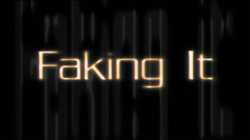Faking It
| Faking It | |
|---|---|

Title card from Series 5
|
|
| Genre | Reality television |
| Created by | Stephen Lambert |
| Directed by | Lance Jeffery Adam Kassen |
| Narrated by | Michael Kitchen |
| Country of origin | United Kingdom |
| Original language(s) | English |
| No. of seasons | 9 |
| No. of episodes | 48 |
| Release | |
| Original network | Channel 4 |
| Original release | 18 September 2000 |
Faking It is a television programme originating on Channel 4 which has spawned various international remakes, including a United States version which began in 2003 on the TLC network. Devised by Stephen Lambert of RDF Media, the programme's original concept was "a modern-day Pygmalion", referring to the George Bernard Shaw play in which flower girl Eliza Doolittle is trained to appear like an .
The programme debuted in 2000 with a run of only two episodes, one of which featured Alex Geikie, a well-spoken gay man, being taught to "fake it" as a London club bouncer. The second episode was a straight use of the Pygmalion concept as a young working-class woman, Lisa Dickinson-Grey, was taught how to behave in high society by Tim Walker, the Daily Telegraph's Mandrake diarist. Since the show began being sold abroad, these episodes have picked up the titles "Alex The Animal" and "Lady Lisa". The series ended on Boxing Day 2006 with faker Sharon Pallister transforming from cleaner to burlesque performer and featured Wayne Sleep, Miss Immodesty Blaize and Dita von Teese.
The first two episodes were well received by critics and a further seven episodes followed in 2001, ten in 2002, five in 2003, thirteen in 2004, three T4 specials, and a final feature-length show in 2005. The programme had always fared well in the ratings, with an average audience of just over two million - a strong showing for Channel 4, which is still to some extent regarded as a minority station.
The programme shared much with earlier British TV shows such as In At The Deep End and Jobs For The Boys/Girls, and more recently the children's show Bring It On, all of which featured TV presenters or other celebrities learning other trades, but Faking It was the first that successfully used members of the public in the role. Its basic format was that a member of the public lived with and trained with an expert for four weeks and then took part in a contest against experienced participants in whatever activity they have learned. A panel of expert judges then gave their verdict on which participant was the "faker". Ostensibly, success meant fooling a majority of the judges, though there was no prize for success and the real point of the show was the experience that the fakers received over the course of the month's filming.
...
Wikipedia
